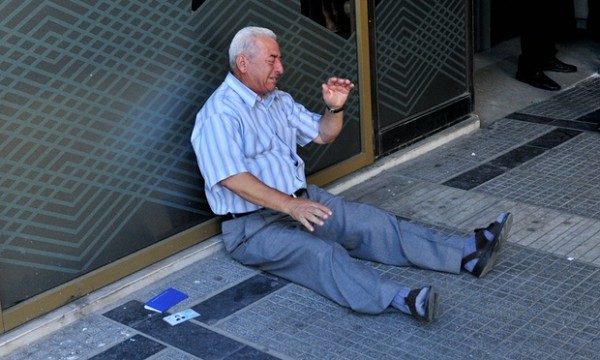Notes
Myth Of The Self-Inflicted Wound: A Deeper Look At That Photo Of The Crying Greek Pensioner
The above photograph starkly signifies the despair and indignation experienced by the Greek people. It depicts a pensioner, who after his fourth failed attempt to withdraw 120 Euros on behalf of his wife, breaks down in tears. In recent weeks this type of photograph has become more and more common as the crisis in Greece worsens. These photographs tend to depict elderly people, lining up in front of banks or scrambling to enter into a bank branch. They are photographs that show people who are fearful that the little they still possess is being taken away. These are the victims of the economic crisis in Greece – only a few failed ATM withdrawals away from absolute poverty.
The mainstream media in the UK has seized upon this photograph, not only because of its symbolic power, but because what actions it provoked after it was taken: an Australian man from a Greek immigrant background recognized the pensioner as an old friend of his late father and came up with the idea to help the man out. The Guardian writes that James Koufos, who will make his way from Sydney to Greece this weekend, has pledged to personally hand over a large donation to the pensioner and old family friend. By all accounts this is a touching story which confirms the symbolic power of the photograph.
In spite of how touching the above story might be, the photograph also achieves something all together more troubling. It depicts the Greek pensioner, and by extension the Greek people, as beaten and worn out. This man crying as he sits on the floor has given up and he has reached the end of his wits. The photograph almost functions like a visual warning to other pensioners in troubled European countries such as Portugal, Italy, Spain, Ireland or even France. The photographs says to those people across Europe, if you dare to vote for a political party that is willing to stand up against the neoliberal ideology of the EU, then you must suffer the consequences. The photographs says that your bank account, your money, not even your future pension will be safe any longer.
The photograph fits into a larger discourse perpetuated by the Western media that the crisis in Greece is largely self-inflicted such as through low productivity, a bloated bureaucracy, lax taxation, fiscally irresponsible behaviour and so forth. To top all these things off, the Greeks – so the Western media likes to report – had the audacity to vote for a “radical” left wing party. In living rooms across wealthy northern European countries the impression is being fostered that perhaps the Greeks deserve to be in this desperate position. In the least, they do not deserve to receive any more bailout money from the EU. And this is precisely where the above photograph feeds into a much larger discourse: as much as Greece has become dependent on bailouts by the EU, the pensioner depicted in the photograph, too, has become dependent on handouts.
The economic endgame that we are currently witnessing in Greece neatly illustrates that the the Euro, by its very design, was predestined to fail. One of the key mandates for the single currency was that it would unify Europe. Though in contrast to this simple mandate, rarely in the last 25 years has Europe been as divided as today. While Germany and perhaps countries such as The Netherlands and Finland “profit” from a currency that is artificially kept low in value, peripheral countries continue to stare into the abyss. Since the Great Financial Crisis of 2007/2008, none of the problems have been fixed in these countries: national debt continues to rise, economies shrink and unemployment grows. In the meantime the banks that were deemed too big to fail in 2008, are now even bigger, loaded with risky assets and barely disguising the fact that they are effectively insolvent. This ponzi scheme is just about held together by one country, the world’s exporting superpower Germany, who has massively benefited from a currency conveniently devalued from the other countries in this so-called union.
The true drama unfolding in the photograph above is therefore not only about the Greek people, nor is it even about the people in other European countries similarly affected by the perverse imbalances caused and equally magnified by the single currency. The true drama of the photograph is that it signifies an economic, monetary and political project that has utterly failed. The Greek government was the first government to recognize this. This crisis will not end until the rest of Europe recognizes this simple truth.
— Marco Bohr
This analysis was cross-posted from the Visual Culture Blog. Marco Bohr’s most recent post, “The European Horror Show,” featuring another photo that circulated over the weekend of European finance ministers deliberating over the Greek debt crisis, can be found here.
(photo: Sakis Mitrolidis/AFP/Getty Images caption: Giorgos Chatzifotiadis weeps outside a national bank branch in Thessaloniki on 3 July.)



Reactions
Comments Powered by Disqus